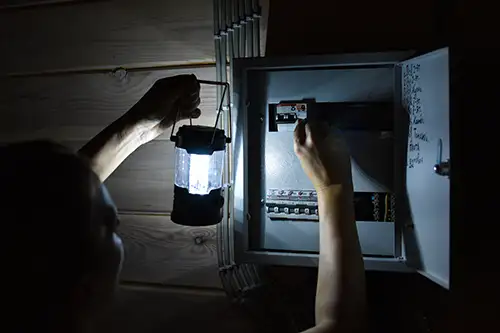
Many parts of the country are heading into storm season in the coming months. Whether it's wildfires in the West or hurricanes along the coast, summer can be a rough time for weather.
And rough weather often means power outages. A blackout that lasts an hour or two isn't a big deal, but one that lasts days can be outright dangerous for you and your family.
You can fare a lot better if you take the time to learn why blackouts happen and how to prepare for them. Experts say it doesn't have to be time consuming, but even a simple blackout plan can save you a lot of headaches.
Interested in understanding the impact solar can have on your home? Enter some basic information below, and we’ll instantly provide a free estimate of your energy savings.
Here's your guide to weathering your next blackout safely, and maybe even comfortably.
Blackouts happen for many reasons. The past few years, the North American Electric Reliability Corporation warned of an increased risk of blackouts throughout much of western North America. The prospect of hotter than normal summers, lower than normal hydroelectric reservoirs and potentially higher than usual demand for electricity all made it more likely the supply of electricity wouldn't have been able to meet the demand for it, triggering blackouts.
More common reasons for blackouts are weather related. Wildfires, hurricanes, thunderstorms and snowstorms can bring down power lines or disrupt electricity generation, causing blackouts.
Even extreme cold on its own can cause the power grid to go down. With more Americans electrifying their home heating systems, extreme cold can ramp up electricity demand beyond what the grid can handle.
"Everything is jumping on the grid at the same time when it gets freezing cold," said Kyle Raabe, president of consumer power at Generac, a company that makes generators and backup batteries.
As extreme weather gets more intense due to climate change, more blackouts could be a consequence. If blackouts do occur in your area, there are a few things you can do beforehand to prepare.
Blackouts are disruptive, plain and simple. Those disruptions could range from something as minor as an interrupted TV show, to something as life-threatening as a temperature-sensitive medicine going bad.
A short blackout may not pose a big danger, but longer ones lasting many hours or even days can put you at risk. Some rural Americans rely on electric well pumps for their drinking water, while just about everyone relies on a fridge to keep their food from spoiling. "Now all the sudden it becomes, can I eat?" Raabe said.
People with limited mobility might be the most vulnerable during a blackout, according to Raabe. If you can't easily jump in a car and drive to a hotel or a friend's home to access electricity, you need to make sure you can safely hunker down in your own home for an extended period.
"It's different for everyone, and it's part of the reason we always recommend, think about it ahead of time," Raabe said.
The Department of Energy has a list of some things to have on hand for blackout preparation. That list is reflected below with a few additions.
The biggest thing you want to avoid during a blackout is improperly using a portable generator. The gas-powered devices emit toxic fumes that you don't want coming into your home. "Number one, keep that away from the house," Raabe said. "Get that thing away from the house and run the cords in."
You also want to avoid frying your expensive electronics with a power surge when the power comes back on. Using a surge protector, or unplugging TVs and computers, can help prevent this.
And of course, try not to open your fridge or freezer frequently during a blackout. You want to preserve the cold (and your food) for as long as possible.
After the power comes back, the hard part is over, but you'll need to dispose of any spoiled food or medicine. With food, it's best to err on the side of caution. Throw things away if they've been unrefrigerated (above 40 degrees) for two or more hours, the Department of Homeland Security says. (The department runs the website Ready.gov with tips to prepare for almost any kind of disaster.) With medicines, it's best to consult with your doctor.
Another key step: Revisit that blackout plan you made and see what you might want to do differently next time. Raabe recommends you ask yourself, "Hey, did my plan work for me?"
A blackout is bound to bring some sort of inconvenience, but managing those problems and staying safe is possible with just a bit of preparation.
Source: cnet.com
Whether your need is to power your business to keep on your production schedule or your home to keep your family safe and sound, South Shore Generator has the product diversity to meet all of your generator requirements. We are proud to sell and service generators from 2kW to 2000kW single set units and up to as large as 100MW utilizing Generac's innovative Modular Power Systems (MPS).